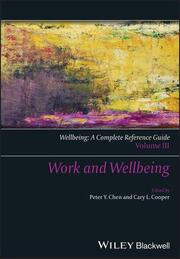Detailansicht
Wellbeing: A Complete Reference Guide
Volume III: Work and Wellbeing, Wiley Clinical Psychology Handbooks 3
ISBN/EAN: 9781118608364
Umbreit-Nr.: 6001860
Sprache:
Englisch
Umfang: 536 S.
Format in cm:
Einband:
gebundenes Buch
Erschienen am 28.02.2014
Auflage: 1/2014
- Zusatztext
- InhaltsangabeAbout the Editors ix Contributors xi Full Contents of Wellbeing: A Complete Reference Guide xiii Introduction to Wellbeing: A Complete Reference Guide xxvii Part 1 Introduction 1 1 Introduction: From Stress to Happiness 3 Peter Y. Chen and Cary L. Cooper 2 Conceptualizing and Measuring Wellbeing at Work 9 Cynthia D. Fisher Part 2 Resources, Coping, and Control 35 3 Job DemandswResources Theory 37 Arnold B. Bakker and Evangelia Demerouti 4 Positive Psychology and Coping: Towards a Better Understanding of the Relationship 65 Philip Dewe 5 The Role of Workplace Control in Positive Health and Wellbeing 91 Erin M. Eatough and Paul E. Spector Part 3 Happy Workers and Happy Organizations 111 6 The Happy Worker: Revisiting the "Happy-Productive Worker" Thesis 113 Peter Hosie and Nada ElRakhawy 7 Organizational Characteristics of Happy Organizations 139 Bret L. Simmons Part 4 Character and Wellbeing 157 8 Character and Wellbeing 159 Thomas A. Wright and Tyler Lauer 9 Stress, Health, and Wellbeing in Practice: Workplace Leadership and Leveraging Stress for Positive Outcomes 175 James Campbell Quick, Joel Bennett, and M. Blake Hargrove Part 5 Organizational Strategies to Promote Wellbeing 205 10 Cancer, Work, and the Quality of Working Life: A Narrative Review 207 Tom Cox, Sara MacLennan, and James N'Dow 11 Lead Well, Be Well: Leadership Behaviors Influence Employee Wellbeing 235 Jennifer Robertson and Julian Barling 12 Organizational Coping Strategies and Wellbeing 253 Gordon Tinline and Matthew Smeed 13 Workplace Mistreatment: Recent Developments in Theory, Research, and Interventions 263 Michael Hanrahan and Michael P. Leiter 14 The Sustainable Workforce: Organizational Strategies for Promoting Work-Life Balance and Wellbeing 295 Ellen Ernst Kossek, Monique Valcour, and Pamela Lirio 15 Development of a Theoretically Grounded Model of Sexual Harassment Awareness Training Effectiveness 319 Lisa M. Kath and Vicki J. Magley 16 The Working Wounded: Stigma and Return to Work 339 Lori Francis, James E. Cameron, E. Kevin Kelloway, Victor M. Catano, Arla L. Day, and C. Gail Hepburn 17 Job Stress in University Academics: Evidence from an Australian National Study 357 Anthony H. Winefield Part 6 From Research to National Policy 379 18 Longitudinal Research in Occupational Stress: A Review of Methodological Issues 381 Robert C. Brusso, Konstantin P. Cigularov, and Rachel C. Callan 19 Measuring Wellbeing in Modern Societies 409 Paul Allin Index 465
- Kurztext
- Wellbeing: A Complete Reference Guide is the first multi-volume, interdisciplinary exploration of the topic of wellbeing. The notion of wellbeing has grown in importance and prominence across the globe in recent years and this reference work provides an in-depth examination of the characteristics that enable individuals and organizations to thrive and flourish. Under the direction of noted academic Cary Cooper, and edited by a distinguished group of senior scholars from a variety of disciplines, this project looks at wellbeing from multiple perspectives, including children and families; the workplace; the environment; later life; economics; and interventions and public policy. Spanning the social sciences and encompassing the latest research, this is an essential reference for scholars, students, professionals, and policymakers who want to enhance and promote human wellbeing. Wellbeing in the Workplace explores a variety of issues in the workplace, from the sources of workplace stress to positive psychology aspects of work. Its scope includes issues at the organizational, managerial, and individual level, including characteristics of workplaces and organizational strategies that are conducive to wellbeing; work-life balance issues; the coping strategies and characters of individuals, and role of government to strengthen wellbeing in a modern society. Chapter authors are international experts in the field, and each contribution reviews the evidence base and discusses the implications for theory and practice in the field of workplace wellbeing.
- Autorenportrait
- Peter Y. Chen is Professor of Management at the University of South Australia Business School. Cary L. Cooper is Distinguished Professor of Organizational Psychology and Health at Lancaster University.
